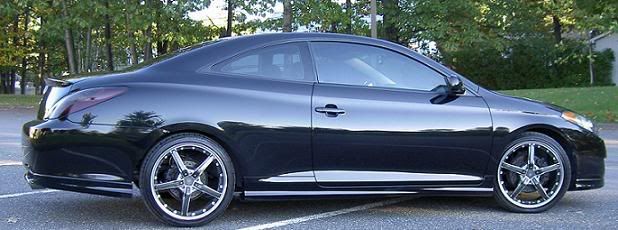Chinky420 wrote:the smaller tire, while making the rotational velocity faster, will make your milage go down, simply because each rotation of the wheel yeilds a shorter distance traveled.
smaller sidewall should create better cornering/handling/braking, as the shorter sidewall creates greater reaction by the tire during operation (less interference with sidewall flex).
unless your 19"+tire is larger (diameter) than the stock setup, you're speedometer is going to read higher than the speed you are actually going. depending on the overall size, it may be a wash, but i don't know since i don't know the exact size of the tires on the 19's
^^ this is also what will cause your breaking distance to increase. lets say, for example that your brakes are engaged for a full wheel rotation under heavy braking (for arguments sake). with the larger diameter wheel/tire, the braking patch is extended since the larger rotation = larger patch of street used to slow down. the smaller the wheel=smaller rotation=smaller patch of road to grab your tires and slow you down. ergo, smaller wheels --> less braking power --> larger distance needed to stop from a fixed speed.
as for the tire pressure issue....does nobody inflate to the recommended PSI that is listed on the rubber?
Typically whats on the tire is the MAX Psi and not recommended. Recommended PSI can vary by car based on weight, geometry, etc. What might be recommended for a certain tire for one car may be completely different for the same exact tire on another car. Tire PSI is a balance between traction and mileage. More PSI = Better mileage, worse dry traction. Less PSI = Worse mileage, better dry traction. There are other factors as well, but these are the main ones. If your not going for Max G's in turns, you can even inflate higher than recommended, up to the max on the tire, and it will generally increase your mileage. At a certain point it, the lost traction can become a safety issue though, so I don't recommended just pumping it to the max.
If you are aired up and your mileage is still much worse, its probably a function of the new wheel/tires themselves. Maybe they are heavy or have a high moment of inertia. Also, if the tires are wider or stickier, there is more friction, and therefore better traction and less mileage. Or maybe now that your stylin', your launching harder from lights and stop signs. But 1.5x worse is still ridiculous.
I've noticed that if I keep the air up and I don't go nuts on the gas, my mileage isn't noticeably worse with my 18x8 @ 40PSI on summer tires as it was with my (gen1) stock 15x6's @ 29PSI (as recommended) on all seasons or winters. My 18s wheels are relatively lightweight at 22lbs.
What size exactly did you upgrade from and what did you upgrade to?
















